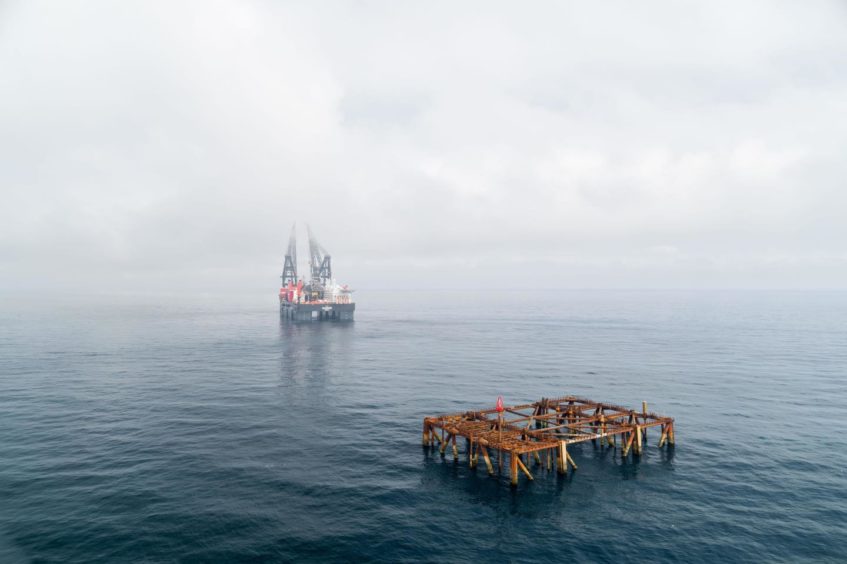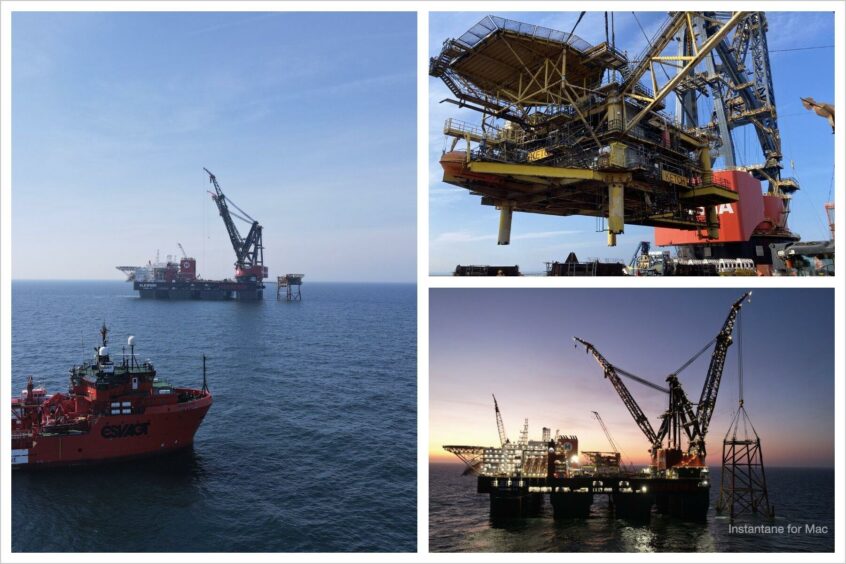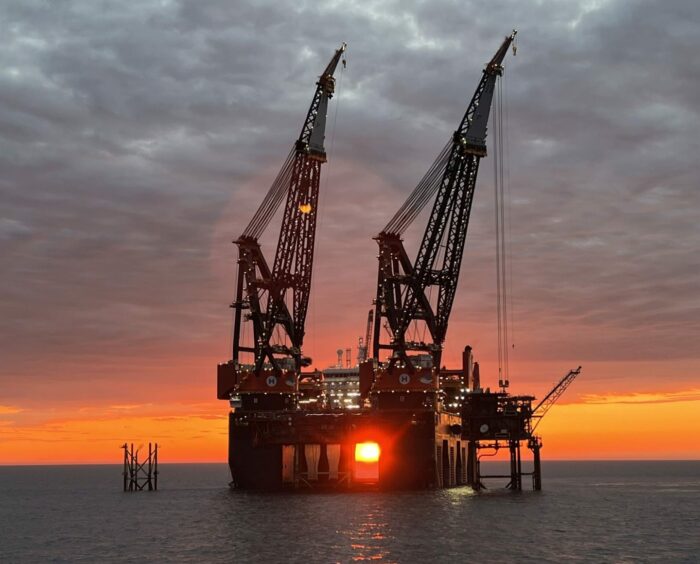
The cost of decommissioning the North Sea has risen to £40 billion as industry inflationary pressures and competition from other sectors take their toll.
Since the tail end of last year, when the North Sea Transition Authority (NSTA) put the estimated bill for cleaning up the basin at £37bn, another £3bn has been added to the total.
The regulator has put the increase down to heightened demand for equipment, vessels and services from other regions and sectors, like offshore wind, which has pushed up prices.
Wider inflationary pressures – that remain a “big part of every business context” – have also played their part.
But the NSTA remains optimistic that industry “can overcome these hurdles” and hit its re-baselined target to reduce the North Sea decom bill by 10%, to £33.3bn by 2028.
Size of the prize
It also used its latest decommissioning cost report to highlight the scale of the opportunity, with £21bn of spend in the pipeline up to 2032.
Equating to roughly £2bn a year for the next decade, the NSTA hailed it as a “massive” chance to keep developing skills and experience in the North Sea.
In turn that will help the domestic supply chain to “win lucrative contracts overseas” by reinforcing the UK as a “global leader” in retiring oil and gas infrastructure.
Pauline Innes, NSTA director of supply chain and decommissioning, said: “The sector is in a good place, and the work that has happened in the last few years to embed decommissioning cost efficiency in the head of operators and suppliers has really started to take traction.
“But the coming decade is going to be incredibly important for us, because that’s when a lot of the work will happen; when you look at that period, the global environment has gotten much more competitive for the supply chain.
“Clearly, inflation is still a big part of every businesses context at the moment, but that has demonstrated to us that companies really need to redouble their efforts. Decommissioning in the UK is a long-term opportunity for the supply chain, one that offers certainty and longevity – there are very few sectors that can say that.”
Promising signs work is here to stay
Between 2017 and 2022 industry spent a total of around £8bn on decom in the North Sea, according to the NSTA’s new report.
A significant proportion of that, £1.6bn, was spent last year alone – more than in any of the previous five years – as companies got on with shutting down redundant wells and removing infrastructure.
There are promising signs for the sector too and domestic companies are in line to benefit significantly from upcoming spend.
According to the £2.2bn worth of Supply Chain Action Plans (SCAPs) lodged with the NSTA last year, UK suppliers will be used for around 70% of the work, or £1.57bn.
That is a good sign the sector is living up to its North Sea Transition Deal pledge to ensure at least half of spending on decom projects goes to the domestic supply chain.
Ms Innes said: “The North Sea decommissioning sector is highly active and productive, and the industry is ideally placed to realise the massive £21 billion opportunity which will come its way over the next 10 years.”
She added: “There has been a reputation in the industry of deferral of work, but the £1.6bn of spend last year tells us that we are now beyond that, and into full delivery mode.
“Invariably there will be fluctuations according to contracts, but we’re confident that broad level of between £1.5bn and £2bn a year that industry is proposing to deliver will be delivered.”
Re-baselining the targets
In November – when it was inevitable that the original goal of 35% by the end of 2022 would be missed – the NSTA set a new cost reduction target for offshore decom.
By the end of 2028 the regulator hopes the total bill for retiring the North Sea will have dropped to £33.3bn, from a £37bn baseline.
Achieving reductions will be “challenging” though, especially when you consider that the cost has subsequently swelled and much of the fat has already been trimmed.
“There’s not a lot of low hanging fruit; this truly is about different contracting models and finding different types of delivery,” says Ms Innes.
In order to make further strides the NSTA is urging operators to build on the sectors track record, while embracing new technologies and innovative commercial models.
The regulator is also pushing them to deliver on their agreed schedules, work more collaboratively with suppliers, and share details of plans earlier.
Bob Fennell, co chairman of the NSTA’s Decommissioning and Repurposing Taskforce (DaRT) and North Sea EVP at Harbour Energy (LON: HBR), said: “It is critical that North Sea operators work together to ensure that oil and gas assets which, at the end of their production life, cannot be repurposed to support new technologies like carbon capture and storage, are decommissioned safely and in the most cost-effective manner.
“Collaborating and sharing data is an important first step to providing the supply chain with the visibility and confidence they require to meet UK demand for such works in a timely and cost-competitive way.”
New decom metrics on the way
For its part the NSTA plans to introduce new key performance indicators and benchmarks – developed with industry and underpinned by the collection of new datasets, including the length of time taken to complete specific tasks, the number of crew members employed, and the types of vessels used.
These metrics will provide a more complete picture of how well decom projects are being planned and executed, helping identify opportunities for industry to improve its overall performance and realise cost efficiencies.
This complements the NSTA’s existing efforts to support the sector by sharing best practice, as well as its Energy Pathfinder portal, which advertises upcoming tendering opportunities.
Sam Long, chief executive of trade body Decom Mission, said: “Decom Mission, as the independent voice of decommissioning in the energy sector, welcomes the 2023 Cost Report. As might be expected, macro factors continue to influence both the cost, pace and delivery of decommissioning in the UKCS and beyond. In working with our members, the NSTA and others we have a wide understanding of how this market is evolving, who is providing the relevant services and future trends. As the report highlights there remains a considerable volume of work to be executed, the majority of which within the immediate decade.
“Decommissioning is but one of many market opportunities that members face, with the continuing advancement of the energy transition and the international need for decommissioning services. Transparency of coming works and interaction between the owner/operator community and the supply chain is key to ensuring that the services, preferably offered from within the UK, exist to meet this current and future demand.
“Meanwhile a revision and rebase of the cost estimate helps ensure that both sides are working with a joined-up view of what is needed and recent dialogue around the correct performance indicators underline the need to ensure a holistic outcome where best practice meets affordable, but profitable services that can then be exported elsewhere.”
Recommended for you


 © Supplied by NSTA
© Supplied by NSTA © Supplied by Three60 Energy
© Supplied by Three60 Energy © Image: Heerema Marine Cont
© Image: Heerema Marine Cont © Supplied by Decom North Sea
© Supplied by Decom North Sea